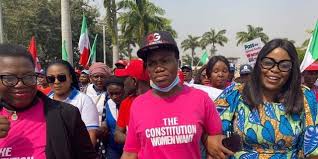The Nigerian Delegation to the ECOWAS Parliament has assured the regional legislature that the five discarded gender equality bills for action are still up for reconsideration by the Nigeria’s National Assembly.
Hon. Linda Ikpeazu, a lawmaker representing Nigeria at the ECOWAS Parliament said this while responding to criticisms by some members of the Parliament following Nigeria’s Presentation at the 2022 First Ordinary Session of the regional Parliament in Abuja yesterday.
The Nigerian National Assembly had on March 1, 2022 rejected constitutional bills seeking to create more inclusion of women in political and appointive positions and other gender equity issues.
This development drew serious criticisms from some Members of the ECOWAS Parliament, who had expressed their disappointment with the Nigerian lawmakers for throwing out the Gender Equity bills that were brought before the House of Representatives.
Ikpeazu while reading Nigeria’s Country report said that despite the five gender bills that were thrown out, Nigeria remains resolute to enact equitable laws that will address gender inequity.
She however, noted that more sensitization will be carried out for Members of the National Assembly to understand the bill better, adding that it will be revisited and hopefully passed into law.
“Nigeria’s commitment to implementation of ECOWAS Texts on Equality of Rights between Women and Men resonates in her ongoing constitution amendment.
“Five of the bills that were put to vote at the National Assembly were focused on gender equity- to promote more opportunities for women in governance and the society at large.
“The Gender Equity Bills underscore the following; additional seat for women in legislature; indigeneship rights for married women; citizenship by registration for non-Nigerian men married to Nigerian women; 35 percent affirmative action for women in political party administration and reserved quota for women in cabinet positions.
“Regrettably, all the bills were rejected. Despite this set back, the Nigerian National Assembly remains resolute in her vision to enact equitable laws that will address gender imbalances in our socio-political environment.
“The leadership is working hard to make sure some of the bills will be re- presented to the House and be passed.
“We are lawmakers and we know that for bills to be passed, we need to do more sensitisation and engagements with our colleagues.
“We have learnt our lessons and with the support of the leadership there will be a difference,” Ikpeazu said.
The Parliamentarians who slammed Nigeria for discarding the gender bills had done so probably because of the expectation that Nigeria will set the pace to meet the 35 per cent affirmation of women inclusion and gender equity.
Hon. Veronika Sessay, a Member of Parliament from Sierra Leone, said that Nigeria as the “Big brother” of Africa should set a pace for other countries to follow as they expect a positive outcome once the bills are reconsidered.
“We were expecting Nigeria to have done this so that we can follow. And let me tell you, Sierra-Leone is on the way and I am sure that in our next reports we will tell you that we have passed the gender bill.
“In as much as they have said that they are taking another commitment that they are going to do it, how soon?
“We were not happy when it was thrown away, so I am appealing to our big brothers, Nigeria, all we need is equality, development and peace, that is what is stated in our national song.
“Where there are more women you will see the change in the world. Nigeria, we expect more from you and let us see how you can pass this bill before Sierra Leone,” Sessay said.
Similarly, Hon. Kibba Barrow from the Gambia urged all Member countries to ensure passage of gender bills that will guarantee women’s rights and gender issues.


